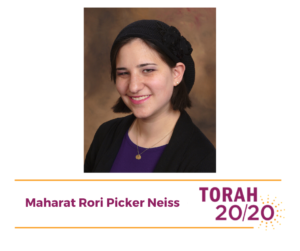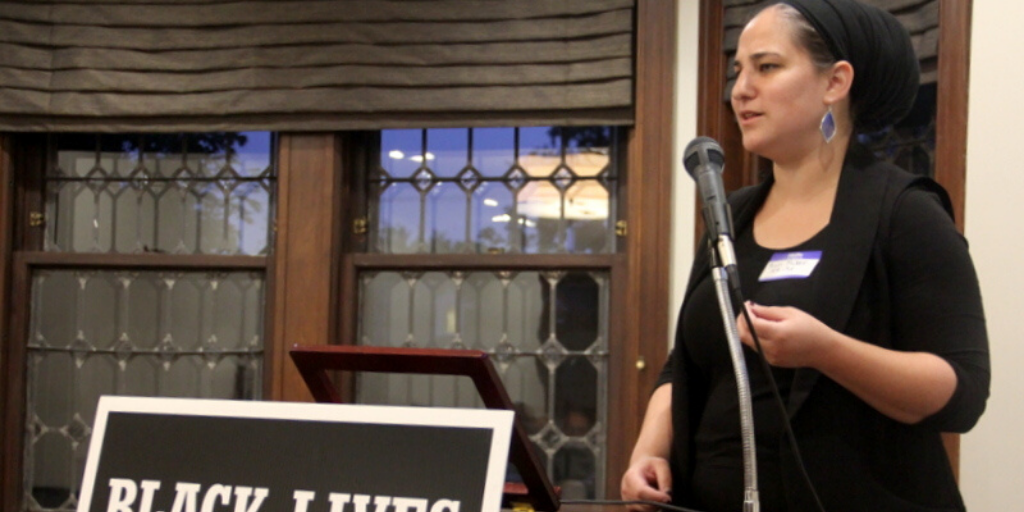A d’var Torah for Parshat Tetzaveh (Exodus 27:20-30:10) by Maharat Rori Picker Neiss.
There are moments, often dramatic and life-changing, when individuals are called upon to step forward and lead. And then there are times, arguably even more significant and consequential, when the moment requires one to step back and allow others to lead. Paradoxically, it is in these latter instances that true leadership emerges.
Parshat Tetzaveh is perhaps most noteworthy in the Torah for what it lacks: any mention of the name of Moses. While the seeming protagonist of our story is still very much present — God commands Moses regarding the intricate details of the priestly garments and the elaborate process of kindling the candelabra as well as the procedures for anointing Aaron and his sons as priests — he remains unnamed throughout this section, an anomaly from the moment he is introduced until he begins his final monologue prior to his death.
A number of commentaries view this absence as proof of Moses’ great humility. They maintain that at the time when the Torah sets the scene for Aaron’s leadership, Moses, in an act of great self-effacement, removes himself from the narrative in order to allow Aaron to shine.
Sign up to receive Torah 20/20 in your inbox each week.
The Alshikh (1508–1593), the rabbi and Biblical commentator of the Ottoman Empire, understands Moses to be stepping back to give space for his brother to lead, but in a very different context. In a poignant and stirring narrative, the Alshikh imagines what must have been going through Moses’ mind. After all the fear and turmoil, heartache and grief, success and redemption of the crushing slavery and miraculous exodus, the people finally arrived at Mount Sinai and received the Torah directly from God. Now, as God describes to Moses the process for establishing a sanctuary for God to reside on earth, we feel the enthusiasm building up in him as he thinks about this holy undertaking. And then we feel his anguished disappointment as God commands him to give the tasks to others — Betzalel and Oholiav to design, the skilled craftsmen to build, and Aaron and his sons to officiate. The Alshikh describes Moses crying out, “What did God do to me that I have no part in this momentous thing?!”
Though Moses steps aside, in this reading he does not do so out of a sense of humility, but at a great personal cost.
Rabbi Jonathan Sacks, the former chief rabbi of Britain, offers a similar commentary. He discerns that later, in the book of Leviticus, when Moses is performing the anointing ceremony described here to establish Aaron and his sons as priests for the tabernacle, the cantillation mark used when Moses brings the sacrifice to begin the ceremony is the shalshelet, the rare intonation rendered musically by a long and elaborate string of notes, giving a strong emphasis to the word on which it occurs. Used only four times throughout the Torah, the shalshelet evokes a feeling of internal conflict and the elongation kindles a feeling of hesitation.
From the outside perspective, the results may be the same — Moses has allowed his brother to step into the limelight and assume a leadership role completely independent of Moses himself. Yet, the process here is crucial. To see the internal turmoil of Moses is to recognize a core function of leadership.
Find more commentaries on Parshat Tetzaveh.
For a society to be sustaining and thriving, power must be shared. This is obvious at times when we recognize the skills that others bring to a role. Betzalel and Oholiav are chosen to be the designers, and at this point we have seen no evidence that Moses has any skill in this area. The same is true for the laborers who are explicitly selected only if they fall under the category of “skilled.” For the priesthood, however, Moses is eminently qualified, perhaps even more so than Aaron. He knows it empirically and he feels pulled to it emotionally.
Moses does not step aside because he recognizes Aaron as more capable; he steps aside in spite of the fact that he does not. And though he grapples with what he must do, he ultimately puts his full support behind his brother. 
Moses’ humility is not because he lacks ego. His humility is because he is willing to set aside his well-deserved ego to support others.
As we experience our democratic processes play out in America and in Israel, may we be blessed with leadership like Moses who recognize that campaigns must be about causes and not the people who espouse them, and that true victory is only when we all win.
Maharat Rori Picker Neiss is the Executive Director of the Jewish Community Relations Council of St Louis and a passionate advocate for Judaism, feminism, interfaith dialogue and social justice.

